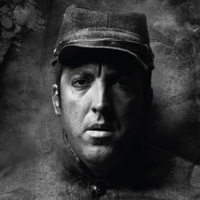Frank Galati's Stage Adaptation of The March set for Steppenwolf Theatre

Tony Award-winning ensemble member Frank Galati returns to the helm at Steppenwolf Theatre with his stage adaptation of The March, Pulitzer Prize-finalist E.L. Doctorow's novel about General William Tecumseh Sherman's Civil War march through Georgia. This marks Galati's second stage production of a Doctorow novel, following the highly-acclaimed musical Ragtime (1998). The much-anticipated production features a cast of 26 playing a mix of fictional and historical characters. The March begins previews April 5 (Opening Night is April 15; Press Performances are April 14 at 3pm and April 17 at 7:30pm) and runs through June 10, 2012 in Steppenwolf's Downstairs Theatre (1650 N Halsted St). Tickets ($20 - $78) are on sale now (prices are subject to change).
"About six years ago, Frank called me and said that he was intrigued by Doctorow's novel and that he had begun adapting it. Like Ragtime, The March is a skillful weaving of history and imagination: Doctorow imagines himself into a crucial moment in American history and populates the world of known historical personages with a rich cast of characters who might go unrecorded in the official narrative, but who profoundly shape the American story," comments Steppenwolf Artistic Director Martha Lavey. "Frank has captured that tapestry with a keen eye toward how to bring those shifting, contrary forces to the stage."
The March was co-commissioned by Steppenwolf and the Oregon Shakespeare Festival, through the American Revolutions: the United States History Cycle. The Revolutions project is Oregon's commitment to commission 37 new plays "sprung from a moment of change, inspiration or conflict in United States history." The number 37 was chosen to match the canon of Shakespeare's work; The March is among the first ten of the plays commissioned.
"We face some of the same issues now that the country faced prior to the Civil War, particularly in the area of state's rights and the role of the federal government. What I cling to in this contemporary world that we inhabit is the notion that history is literature, and that, to a certain extent, literature is history. The historical record is a narrative. And the fictional evocation of the past by a novelist like E.L. Doctorow is also an effort to seek the truth," adds director Frank Galati. "I think it's through the fictional characters that Doctorow is able to reach into our own hearts and connect us to the events of the past. These fictional characters live a kind of italicized present; they stand out from the background of historical event."
The March features ensemble members Alana Arenas (Wilma), Ian Barford (Arly Wilcox), K. Todd Freeman (Roscoe/Jake Early/Moses Brown/Calvin Harper, May 31 - June 10), Martha Lavey (Letitia Pettibone/Nurse), Mariann Mayberry (Mattie Jameson), James Vincent Meredith (Coalhouse Walker) and Alan Wilder (John Jameson/Sgt. Baumgartner/Gen. William Hazen/Josiah Culp) with Will Allan (Lt. Clarke/Sgt. Stephen Walsh), Phillip James Brannon (Roscoe/Jake Early/Moses Brown/Calvin Harper, April 5 - May 30), Cliff Chamberlain (Maj. Morrison), Patrick Clear (Maj. Gen. Nathaniel Wayne/Edwin Stanton/Old Man/Gen. Joseph A. Mower), Carrie Coon (Emily Thompson), Alex Goldklang (Boy on the March), Harry Groener (Gen. William Tecumseh Sherman), Stephen Louis Grush (Will B. Kirkland), Anthony Kayer (Boy on the March), Michael Mahler (Sgt. Malone/Gen. Henry W. Slocum), Shannon Matesky (Pearl), Luce Metrius (Boy on the March), Andy Monson (Boy on the March), John Mossman (Col. Teack), Alex Newkirk (Boy on the March), Alex Ring (Boy on the March), Joe Sinopoli (Boy on the March), Philip R. Smith (Dr. Wrede Sartorius), Alex Stage (Boy on the March) and L.J. Slavin (Musician).
General William Tecumseh Sherman, Uncle Billy to his men, marches 62,000 Union soldiers through lush Georgia countryside. Bearing along both black and white refugees, the march destroys everything in its path, turning home into exile and exile into home. Its epic force forever changes the lives of those caught up in its sweep: a liberated slave, a sheltered daughter of a Southern judge, a pair of Confederate deserters and Uncle Billy himself. The March is a story of momentous upheaval and the limits of courage and love.
Steppenwolf's 2011/12 season, Dispatches from the Homefront, explores how everyday lives are touched by war. In each of the five plays, war exerts a pressure-sometimes centrally, sometimes obliquely-on the lives of the characters-and moves them to action. The plays are alive with the humor, the tenderness and the urgency of lives struggling to find home.
